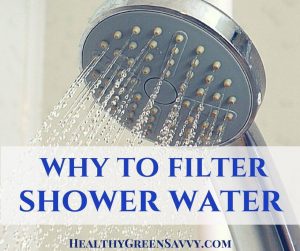Last Updated on February 16, 2024
A shower filter protects you from exposure to chemicals that may be more harmful in the shower than in drinking water. Here’s what you need to know.
I had thought that getting a high-quality filter for our drinking water meant we were protected from the industrial chemicals most water supplies are riddled with.
It turns out there’s more to avoiding the chemicals in our water than most of us think. Showering and bathing in that water exposes us to a lot of those chemicals as well.
(After a ton of research, this is the drinking water filter we chose.)
The good news: This one has a *really* easy fix, unlike some of the more complicated and expensive things you need to do to protect your family in a polluted world.
Screwing on a quality shower filter took me less than a minute. No more chemicals raining down on us in the shower!
Why I decided to install a shower filter
Chemicals don’t just enter our body through food and drink. We can take up chemicals in water through our skin and lungs.
As I’m sure you know, our water is full of environmental pollutants of all kinds, including some we add intentionally, like chlorine and chloramines for disinfection. While killing disease-causing microbes is of course a good thing, it turns out that when we run water treated with these chemicals through our showers, we fill our bathrooms with chlorine and chloramine gasses, along with a number of disinfection byproducts incuding choloform.
Studies have linked exposure to these chemicals in showers to an increase in some types of cancer.
Also, remember that our skin is pretty effective at absorbing chemicals, which is why we’re so careful about the ingredients in skin care products.
What’s in your water? Why a shower filter may be a savvy move
I checked which contaminants are found in my municipal water supply, and discovered most of them are disinfection byproducts, which are found in my water at 2-7 times the levels of the health guidelines:
One common by-product of disinfection is chloroform, which EPA classifies as a “probable human carcinogen.” It’s found in my water at more than twice the health guideline of 1 part per billion. The average nationwide? ELEVEN times that number.
The Agency for Toxic Substances and Disease Registry reports that
Chloroform can enter your body if you breathe air, eat food, or drink water that contains chloroform. Chloroform easily enters your body through the skin. Therefore, chloroform may also enter your body if you take a bath or shower in water containing chloroform. In addition, you can breathe in chloroform if the shower water is hot enough for chloroform to evaporate. Studies in people and in animals show that after you breathe air or eat food that has chloroform in it, the chloroform can quickly enter your bloodstream from your lungs or intestines.
Further, our skin has its own delicate microbial ecology, and pummeling these beneficial microbes with chemicals designed to kill microbes may harm that ecology. It’s possible the chemicals in our water could also affect the ecology of our gut, which research continues to show as critically important to numerous health outcomes.
Is a shower filter really necessary?
OK, you may say, but I’ve been showering without a filter for years, and I’m fine.
True enough, but just because you don’t yet feel the effects of chemical exposure doesn’t mean they’re not subtly affecting your health and disease risk. The toxic burden of the current generation is higher than ever before in human history, and we just don’t know yet what this means for people’s health long-term.
We do know that rates of a number of diseases and disorders have been climbing and that many of them have been linked to environmental chemical exposure.
What emerging research in the fields of epigenetics and environmental toxicology is beginning to make clear is that very small amounts of chemicals can have bigger long-term consequences than we realize.
A recent conversation I had with public health expert Bruce Lanphear also helped me understand how diverse types of exposure may have a multiplicative (rather than additive) effect on health. That is, exposure to one compound may double our risk of a given disease, but exposure to an additional compound may make it EIGHT times as likely.
He’s created a short video to help people understand how these compounds may affect health. Check it out here.
The complex interplay between our genes and the thousands of chemicals we’re exposed to is only beginning to be understood, but scientists speculate the chemical soup we’re all stewing in may be involved in increases in the incidence of neurological problems, autoimmune diseases and more.
Developing fetuses seem particularly susceptible to the effects of these chemicals, so please if you’re pregnant be even more careful to avoid them wherever you can.
If you can easily decrease your chances of contracting a life-altering or fatal disease, why wouldn’t you?
How to Choose An Effective Shower Filter
There are lots of shower filters to choose from, but it’s important to do a little homework first. You need to know if your water department uses chlorine or chloramines for disinfection.
Chloramines are used in about a fifth of American water supplies, and most shower filters don’t remove them. Google your town and “water report” and you’ll see either chlorine or chloramines in the annual report along with other contaminants found.
If you have chloramines in your water, the Propur Promax Shower filter is one of the few that removes them. Most filters don’t, nor do they remove all the pesticide residues, VOCs and a truly ridiculous number of other chemical contaminants that I don’t particularly want sprayed at me every time I try to get clean! Check out the list of contaminants removed by the Propur filter.
Also, filters that remove chlorine don’t take out the byproducts of chlorination, so even though Propur’s filter doesn’t take out as much chlorine as some chlorine shower filters, it takes out a lot of the other contaminants in my town’s water, so it’s still worth considering if your water is disinfected with chlorine.
I’ve worked hard to get harmful chemicals out of my home — why would I want to send them into the air every time someone showers? I’m thrilled with this new weapon against the onslaught of industrial chemicals and will be getting additional shower filters for our other bathrooms.
A shower filter doesn’t hurt water pressure
Installing this filter was as easy as twisting off the old shower head and twisting the Propur shower filter on. The filter has 5 settings to choose from, most of them quite powerful.
The flow rate on this shower filter is 2 gallons per minute, which felt quite a bit stronger than I was used to, even on the gentlest setting. Because my shower control doesn’t let me send less water through, I found the lowest setting to be a little fast, if not uncomfortable in pressure. I can’t relax in a shower shooting water at me that fast, but if you like powerful showers you have nothing to worry about with this filter.
I contacted Propur to see if there was anything they could do to reduce the pressure, and they sent me a free flow restrictor, which dropped the flow rate down to 1.5gpm, typical for a low-flow showerhead.
That’s a decent savings, and can add up to thousands of gallons per year. You save on the costs of heating all that water as well. And though there’s no specific data on it, slowing the rate that the water travels through the filter should help it remove a greater percentage of contaminants.
If you want to slow the flow and save water, that’s a simple fix. (Just put a note in with your order and they’ll send a restrictor free of charge.) If you have a better shower control than I have, you can also just let through as much or as little water as you like. If we replace our shower controls, I’ll be looking for smarter ones.
Other considerations when choosing a shower filter
Even with this lower pressure, presumably because of the nasties being removed from the water, I noticed that my skin was getting clean more easily. My soap removes oil from my skin far more readily than it did before I installed the shower filter. If you have dry skin, you may want to switch to a more gentle cleanser.
A potential drawback of shower filters is that they only come in plastic or chrome, which was initially a bit of an obstacle for us, since we have bronze fixtures. But the advantages of installing this filter easily outweighed the pretty minor aesthetic objection. I mean, how often is the inside of your shower on view?
The filter lasts for up to 9 months before needing replacement.
If you want to shower in water with fewer contaminants, hop on over to Pure Living Space and take a look at their shower filter options. Then enjoy your less-polluted shower!
PureLivingSpace is offering HealthyGreenSavvy readers 10% off their purchase with the code ‘Savvy.’
Pin to save this important information about how to choose a shower filter!
Disclaimer: I’m a health enthusiast, not a medical professional. Content on this website is intended for informational purposes only and is not meant to provide personalized medical advice. I draw on numerous health sources, some of which are linked above. Please consult them for more information and a licensed professional for personalized recommendations.
Disclosure: I received a complimentary filter to try in exchange for my honest review. I only promote products I believe in and am comfortable using on my own family. All opinions strictly my own.
Photo credits: kboyd, Propur

Susannah is a proud garden geek and energy nerd who loves healthy food and natural remedies. Her work has appeared in Mother Earth Living, Ensia, Northern Gardener, Sierra, and on numerous websites. Her first book, Everything Elderberry, released in September 2020 and has been a #1 new release in holistic medicine, naturopathy, herb gardening, and other categories. Find out more and grab your copy here.







 Hi, I'm Susannah, a garden geek, energy nerd, and fan of healthy food and natural remedies. Need some simple, practical solutions for living healthier and greener? You've come to the right place! More about me and my green projects
Hi, I'm Susannah, a garden geek, energy nerd, and fan of healthy food and natural remedies. Need some simple, practical solutions for living healthier and greener? You've come to the right place! More about me and my green projects